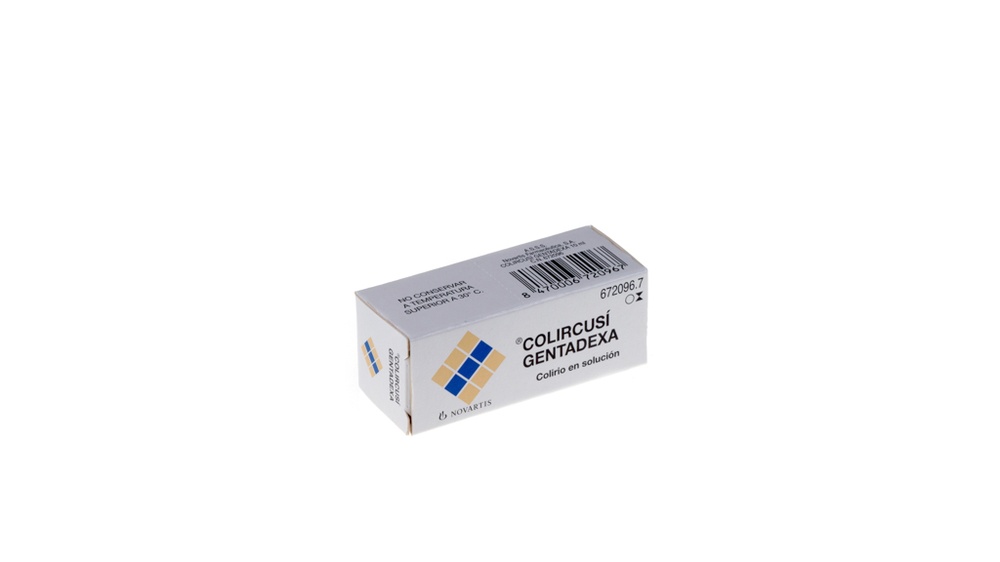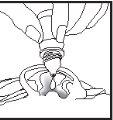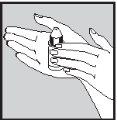

COLIRCUSI GENTADEXA 5 mg/mL + 1 mg/mL + 0,5 mg/mL COLÍRIO/GOTAS ÓTICAS EM SOLUÇÃO

Pergunte a um médico sobre a prescrição de COLIRCUSI GENTADEXA 5 mg/mL + 1 mg/mL + 0,5 mg/mL COLÍRIO/GOTAS ÓTICAS EM SOLUÇÃO

Como usar COLIRCUSI GENTADEXA 5 mg/mL + 1 mg/mL + 0,5 mg/mL COLÍRIO/GOTAS ÓTICAS EM SOLUÇÃO
Introdução
Prospecto: informação para o utilizador
COLIRCUSÍ GENTADEXA 5 mg/ml + 1 mg/ml + 0,5 mg/ml colírio/gotas óticas em solução
gentamicina sulfato/dexametasona fosfato sódico/tetrizolina hidrocloruro
Leia todo o prospecto detenidamente antes de começar a usar este medicamento, porque contém informações importantes para si.
- Conserva este prospecto, porque pode ter que voltar a lê-lo.
- Se tiver alguma dúvida, consulte o seu médico ou farmacêutico.
- Este medicamento foi-lhe prescrito apenas para si, e não deve dá-lo a outras pessoas, mesmo que tenham os mesmos sintomas que si, porque pode prejudicá-las.
- Se experimentar efeitos adversos, consulte o seu médico ou farmacêutico, mesmo que se trate de efeitos adversos que não aparecem neste prospecto. Ver secção 4.
Conteúdo do prospecto
- O que é COLIRCUSÍ GENTADEXA e para que é utilizado
- O que necessita saber antes de começar a usar COLIRCUSÍ GENTADEXA
- Como usar COLIRCUSÍ GENTADEXA
- Posíveis efeitos adversos
- Conservação de COLIRCUSÍ GENTADEXA
- Conteúdo do envase e informações adicionais
1. O que é COLIRCUSÍ GENTADEXA e para que é utilizado
É uma associação de tratamentos para inflamação e infecção no olho e ouvido. Contém como princípios ativos, gentamicina, um antibiótico que pertence a um grupo chamado aminoglucósidos usado para tratar infecções, dexametasona, um corticosteroide com propriedades anti-inflamatórias e anti-alérgicas, e tetrizolina, com ação descongestiva (produz estreitamento dos vasos sanguíneos visíveis do olho); três componentes que trabalham juntos para tratar a infecção e a inflamação.
Uma das substâncias ativas deste medicamento é um antibiótico. Os antibióticos são utilizados para tratar infecções bacterianas e não servem para tratar infecções virais.
É importante que siga as instruções relativas à dose, ao intervalo de administração e à duração do tratamento indicadas pelo seu médico.
Não guarde nem reutilize este medicamento. Se uma vez finalizado o tratamento lhe sobrar antibiótico, devolva-o à farmácia para a sua correta eliminação. Não deve deitar os medicamentos pelo desague nem para o lixo.
Colircusí Gentadexa está indicado para o tratamento de infecções do polo anterior do olho com complicações inflamatórias que respondem aos corticosteroides, causadas por germes sensíveis à gentamicina. Tais como conjuntivite, ou seja infecção da conjuntiva (membrana transparente que cobre o olho) e blefaroconjuntivite (inflamação do párpado) infecciosas e alérgicas. Também para a queratite, ou seja a inflamação da córnea ou camada transparente que cobre a parte anterior do olho (de tipo superficial, profunda, por certa reação de hipersensibilidade ou flictenular, esclerosante, do acné rosácea) e para o tratamento da inflamação do branco do olho, profunda (esclerite) e superficial (episclerite).
Colircusí Gentadexa também é utilizado para o tratamento de infecções do/los ouvido/s (óticas) como otite externa alérgica e em todas aquelas condições em que se requer tratamento corticosteroide-antibiótico.
2. O que necessita saber antes de começar a usar COLIRCUSÍ GENTADEXA
Não use COLIRCUSÍ GENTADEXA
Se é alérgico à gentamicina, dexametasona, tetrizolina ou produtos relacionados, ou a algum dos outros componentes deste medicamento (incluídos na secção 6).
Não use Colircusí Gentadexa nos seus olhos:
- Se tem ou acredita que pode ter:
- Glaucoma simples.
- Glaucoma de ângulo estreito ou ângulo estreito nos seus olhos por anatomia (com bloqueio dos canais de drenagem).
- Varicela ou qualquer outra infecção do olho causada por vírus.
- Doenças por fungos (fúngicas) do olho ou infecções do olho não tratadas provocadas por parasitas.
- Tuberculose do olho.
- Depois da extração de um corpo estranho da córnea.
Não use Colircusí Gentadexa nos seus ouvidos:
- Se tem ou acredita que pode ter:
- Infecção no canal do ouvido causada por fungos ou vírus, ou infecções não tratadas provocadas por parasitas.
- Tímpano danificado, ou mesmo perfurado.
Advertências e precauções
Consulte o seu médico ou farmacêutico antes de começar a usar Colircusí Gentadexa.
- Apenas utilize este medicamento nos seus olho(s) ou ouvido(s).
- Devido ao risco de possíveis efeitos em outras zonas distintas do corpo (sistémicos), tenha especial cuidado em crianças, se tem uma idade avançada ou antecedentes de doenças do coração graves, como hipertensão, arterioesclerose, doenças coronárias, aneurisma (bolsa nas paredes de uma artéria ou uma veia), ou outras doenças cardiovasculares ou se tem propensão a elas, como se é diabético; se costuma sofrer uma baixa de tensão ao mudar de postura ou tem hiperatividade da tireoide, ou um tumor da glândula adrenal (feocromocitoma).
- Pela presença de tetrizolina, pode aparecer dilatação da pupila, aumento da pressão nos olhos e efeitos adversos sistémicos por absorção. Foram relatados casos de efeitos como dor de cabeça, aumento da pressão sanguínea, alterações do ritmo do coração (extrasístoles), batimentos rápidos, tontura e acidentes cerebrovasculares. É necessária precaução em caso de que lhe estejam administrando determinados anestésicos (por exemplo, halotano).
- Se está utilizando inibidores da monoaminoxidase (IMAO) ou nos últimos 15 dias pode sofrer com este medicamento um aumento acentuado da pressão sanguínea. Também com outros produtos que aumentam a tensão.
- Foram observados efeitos adversos graves como toxicidade no Sistema Nervoso (neurotoxicidade), no ouvido e no rim (nefrotoxicidade) com antibióticos aminoglucósidos utilizados por vias sistémicas (internas, como por exemplo a via oral) ou quando estes são aplicados localmente em feridas abertas ou na pele danificada.
- Se experimentar reações alérgicas com este medicamento, tais como coceira do párpado, inchaço ou vermelhidão do olho, interrompa o tratamento e consulte o seu médico. As reações alérgicas podem variar desde coceira localizada ou vermelhidão até reações alérgicas graves (reação anafiláctica) ou reações graves da pele. Estas reações alérgicas podem ocorrer com outros antibióticos tópicos ou sistémicos da mesma família (aminoglucósidos).
- Se ao mesmo tempo está utilizando outro tratamento antibiótico, consulte o seu médico.
- Se os seus sintomas pioram ou lhe voltam a aparecer, consulte o seu médico. Com o uso deste medicamento durante largo tempo, pode tornar-se mais sensível às infecções nos olhos ou ouvidos, como infecções por fungos; em caso de este tipo de infecção deve interromper o tratamento.
Se lhe aparecer outra infecção, o seu médico lhe indicará o tratamento para tratar a mesma.
- Se utilizar este medicamento durante um período longo de tempo nos seus olhos, pode:
- Sofer aumento de pressão no olho(s) e/ou glaucoma. Deve controlar regularmente a pressão do olho enquanto utiliza este medicamento. Isto é especialmente importante em crianças, pois o risco de aumento da pressão ocular causado por corticosteroides pode ser maior em crianças e ocorrer antes que em adultos.
- Também se lhe podem produzir cataratas.
Em tudo isto, os pacientes propensos (por exemplo, diabéticos e miopes) têm maior risco.
- Deve visitar o seu médico frequentemente se utilizar este medicamento durante um longo período de tempo.
- Desenvolver a síndrome de Cushing devido a que o medicamento chegue ao sangue. Consulte o seu médico se sofre inchaço e aumento de peso ao redor do tronco e na face, pois estas são, por norma, as primeiras manifestações da síndrome de Cushing. Pode produzir-se uma supressão da função da glândula adrenal após interromper um tratamento intensivo ou a longo prazo com Colircusí Gentadexa. Consulte o seu médico antes de interromper o tratamento por sua conta. Estes riscos são especialmente importantes em crianças e pacientes tratados com um medicamento chamado ritonavir ou cobicistat.
- Os esteroides aplicados no olho podem retardar a cura de feridas do mesmo. Também se sabe que os AINEs (Anti-inflamatórios Não Esteroideos) oftálmicos enlentecem ou retardam a cicatrização. O uso conjunto de AINEs e esteroides oftálmicos pode aumentar os problemas de cicatrização.
- Se sofre um distúrbio causante de adelgaçamento dos tecidos do olho antes de usar este medicamento, consulte o seu médico, pois poderia produzir-lhe perfuração da córnea.
- Com o uso prolongado deste medicamento, poderia sofrer secura anormal nos olhos, que pode piorar os sintomas de conjuntivite alérgica.
- Ponha-se em contacto com o seu médico se apresentar visão borrosa ou outras alterações visuais.
- Se utiliza lentes de contacto:
- Usar lentes de contacto (duras ou macias) não é recomendado durante o tratamento de uma inflamação ou infecção do olho.
Via ótica
Em caso de utilização nos ouvidos (por via ótica), o médico deve rever o estado do seu tímpano.
Crianças
Não utilize Colircusí Gentadexa em crianças menores de 18 anos, pois não se estabeleceu a sua segurança e eficácia.
Pacientes de idade avançada
Não se estabeleceu a segurança e eficácia deste medicamento nos pacientes de idade avançada.
Outros medicamentos e Colircusí Gentadexa
Informa ao seu médico ou farmacêutico se está utilizando, utilizou recentemente ou pode ter que utilizar qualquer outro medicamento.
Informa ao seu médico se está utilizando AINEs oftálmicos. O uso concomitante de corticosteroides e AINEs oftálmicos pode aumentar os problemas de cicatrização da córnea.
Especialmente comunique ao seu médico se está tomando ou pode estar exposto a inibidores da monoaminoxidase (IMAO).
Informa ao seu médico se está usando ritonavir ou cobicistat, pois pode provocar um aumento da quantidade de dexametasona no sangue.
Gravidez, lactação e fertilidade
Se está grávida ou em período de lactação, acredita que possa estar grávida ou tem intenção de ficar grávida, consulte o seu médico ou farmacêutico antes de utilizar este medicamento.
Colircusí Gentadexa não é recomendado durante a gravidez.
Se está em período de lactação, o médico deve decidir se é necessário interromper a lactação ou interromper o tratamento com este medicamento, tendo em conta o benefício da lactação para o bebê e o benefício do tratamento para a mãe.
Condução e uso de máquinas
Uso nos seus olhos:Pode notar visão borrosa imediatamente após a aplicação de Colircusí Gentadexa durante um tempo. Não conduza nem utilize máquinas até que este efeito tenha desaparecido.
Uso nos seus ouvidos:Não se esperam efeitos na condução ou no uso de máquinas.
Colircusí Gentadexa contém cloruro de benzalconio e fosfatos
Este medicamento contém 0,04 mg de cloruro de benzalconio em cada ml.
Uso nos seus olhos:O cloruro de benzalconio pode ser absorvido pelas lentes de contacto macias, alterando a sua cor. Retire as lentes de contacto antes de usar este medicamento e espere 15 minutos antes de voltar a colocá-las.
O cloruro de benzalconio pode causar irritação ocular, especialmente se padece de olho seco ou outras doenças da córnea (camada transparente da zona frontal do olho). Consulte o seu médico se sente uma sensação estranha, coceira ou dor no olho após usar este medicamento.
Este medicamento contém 1,8 mg de fosfato em cada ml.
Se sofre de dano grave da córnea (a camada transparente da parte frontal do olho), o tratamento com fosfatos, em casos muito raros, pode provocar visão borrosa por acumulação de cálcio.
Uso nos seus ouvidos:O cloruro de benzalconio pode provocar irritação na pele. Não aplique sobre a mucosa.
3. Como usar COLIRCUSÍ GENTADEXA
Siga exatamente as instruções de administração deste medicamento indicadas pelo seu médico. Em caso de dúvida, consulte novamente o seu médico ou farmacêutico.
Colircusí Gentadexa pode ser utilizado como colírio para os olhos (via oftálmica) e gotas para os ouvidos (via ótica).
Como usar no olho (via oftálmica)
A dose recomendada é:
Adultos: 1 ou 2 gotas no olho(s) afetado(s) cada 4 ou 5 horas (em infecções graves, a frequência de instilação pode aumentar). A frequência pode reduzir-se segundo o seu médico.
O tratamento deve reduzir-se gradualmente, reduzindo a frequência de administração.
O tratamento não deve ultrapassar os 14 dias, salvo outra indicação do médico.
Recomendações de uso

1 2 3
- Lave as mãos.
- Coja o frasco (envase conta-gotas).
- Depois de abrir o frasco pela primeira vez, deve retirar o anel de plástico do precinto se estiver solto.
- Sostenha o frasco, boca abaixo, entre os dedos.
- Incline a cabeça para trás. Separe suavemente o párpado do olho com um dedo até que se forme uma bolsa entre o párpado e o seu olho, na qual deve cair a gota (figura 1).
- Aproxime a ponta do frasco do olho. Pode ser-lhe útil um espelho.
- Não toque o olho ou o párpado, zonas próximas nem outras superfícies com o conta-gotas. As gotas poderiam contaminar-se.
- Aperte suavemente a base do frasco com o dedo indicador para que caia uma gota de cada vez (figura 2).
- Depois de utilizar o colírio, solte o párpado, feche o olho e pressione suavemente com o dedo o bordo do olho junto à nariz durante pelo menos 2 minutos. Isto ajuda a evitar que este medicamento passe para o resto do corpo (figura 3).
- Se aplicar gotas em ambos os olhos, repita todos os passos anteriores com o outro olho.
- Feche bem o frasco imediatamente após utilizar o produto.
Se uma gota cair fora do olho, tente novamente.
Se os sintomas não melhoram em 2 dias, consulte o seu médico.
Se usar mais Colircusí Gentadexa do que deve, pode eliminá-lo lavando os olhos com água morna. Não se aplique mais gotas até que volte a tocar-lhe.
Se está utilizando outros medicamentos oftálmicos, espere pelo menos 5 minutos entre a administração deste colírio e os outros medicamentos oftálmicos. As pomadas oftálmicas devem ser administradas por último.
Como usar no ouvido
A dose recomendada é:
Adultos: 3 ou 4 gotas no ouvido(s) afetado(s), 3 vezes ao dia.
O tratamento não deve ultrapassar os 14 dias.
Recomendações de uso



1 2 3
- Lave as mãos
- Coja o frasco (envase conta-gotas) e mantenha-o alguns minutos na sua mão para aquecer o conteúdo e evitar que a gota esteja muito fria quando penetrar no ouvido (figura 1).
- Sostenha o frasco boca abaixo entre os dedos.
- Deite-se de lado deixando o ouvido afetado dirigido para cima.
- Aproxime a ponta do frasco do canal auditivo (figura 2).
- Não toque o lóbulo da orelha, o canal auditivo ou zonas próximas nem outras superfícies com o conta-gotas. As gotas poderiam contaminar-se.
- Deixe cair uma gota deste medicamento de cada vez, apertando suavemente a base do frasco com o dedo indicador.
- Permaneça deitado durante pelo menos 5 minutos para permitir que as gotas óticas fluam para dentro do canal auditivo (figura 3).
- Se aplicar gotas em ambos os ouvidos, repita os passos anteriores para o outro ouvido.
- Feche bem o frasco imediatamente após utilizar o produto.
Se uma gota cair fora do ouvido, tente novamente.
Se usar mais COLIRCUSÍ GENTADEXA do que deve
Não se aplique mais gotas até a próxima dose.
Uma sobredose nos olhos pode eliminá-la lavando os olhos com água morna.
Podem ocorrer (especialmente em crianças) reações graves como sintomas de depressão do sistema nervoso central e reações graves que afetam o coração e a circulação; entre outros sintomas, baixa da temperatura do corpo, batimentos do coração lentos, suor, desvanecimento, subida de tensão seguida de baixa.
Outros sintomas que podem aparecer se ingerir acidentalmente o medicamento, especialmente por crianças, são: palpitações, batimentos do coração irregulares, dor de cabeça, tontura, náuseas, vómitos, dilatação das pupilas, dificuldade respiratória, ou outros.
Em caso de sobredose ou ingestão acidental, consulte imediatamente o seu médico ou farmacêutico, ou acuda a um centro médico ou ligue para o Serviço de Informação Toxicológica, telefone 91 562 04 20, indicando o medicamento e a quantidade utilizada.
Se esquecer de usar COLIRCUSÍ GENTADEXA
Não se aplique uma dose dupla para compensar a dose esquecida.
Aplique uma única dose assim que se der conta, e continue com a próxima dose que estava prevista. No entanto, se já é quase a hora da próxima dose, não se aplique a dose esquecida e continue com a próxima dose do seu regime habitual.
Se tiver alguma outra dúvida sobre o uso deste medicamento, pergunte ao seu médico ou farmacêutico.
4. Efeitos adversos possíveis
Tal como todos os medicamentos, este medicamento pode produzir efeitos adversos, embora nem todas as pessoas os sofram.
Foram observados os seguintes efeitos adversos quando se utiliza este medicamento no olho.
Frequência desconhecida (não pode ser estimada a partir dos dados disponíveis):
- Efeitos no olho: irritação no olho, dor no olho (incluindo ardor), alergia local, visão borrosa.
- Efeitos adversos gerais: alergia (hipersensibilidade).
- Problemas hormonais: crescimento excessivo de pelos corporais (particularmente nas mulheres), fraqueza e desgaste muscular, estrias roxas na pele do corpo, aumento da pressão arterial, menstruações irregulares ou ausentes, alterações nos níveis de proteínas e cálcio do corpo, atraso no crescimento em crianças e adolescentes e inchaço e aumento de peso do corpo e da face (síndrome de Cushing) (ver seção 2, "Advertências e precauções").
Foi relatado, raramente, casos de calcificação na córnea com o uso de colírios que contêm fosfatos, em pacientes com as córneas afetadas de forma importante.
Descrição de efeitos adversos selecionados
Uso nos olhos:
O uso prolongado de corticosteroides oftálmicos pode ocasionar hipertensão ocular e/ou glaucoma, que pode causar deterioração do nervo óptico, afetando a acuidade visual e no campo visual; também pode produzir catarata. E pode aparecer atraso na cicatrização da córnea.
O corticosteroide (dexametasona) pode produzir tontura, dor de cabeça, inflamação da córnea, conjuntivite, olho seco, tingimento na córnea, sensibilidade à luz do sol (fotofobia), visão borrosa, coceira no olho, sensação de corpo estranho, aumento de lacrimejamento, crosta no canto do olho, vermelhidão do olho, erosão na córnea, dilatação da pupila.
Em pacientes com doenças que causam adelgaçamento da córnea ou esclerótica, o uso tópico de corticosteroides provoca perfuração corneal, mais provável em tratamentos prolongados.
Foram desenvolvidas infecções secundárias após o uso combinado de fármacos corticosteroides e antimicrobianos (como por exemplo, gentamicina).
Devido à presença de tetrizolina na composição, pode aparecer além de outros efeitos adversos citados, inflamação da pálpebra (blefarite), efeitos adversos sistémicos (em partes internas do corpo) como resultado da absorção, que parecem mais frequentes em crianças e pessoas de idade avançada. Foi relatado de toxicidade sistémica com a aplicação local de fármacos simpaticomiméticos, como tetrizolina, tais como dor de cabeça, aumento da pressão sanguínea, suor, alterações do ritmo do coração (extrasístoles), palpitações, desmaio, e acidentes cerebrovasculares.
Outras reações adversas informadas por via oftálmica são defeitos epiteliais na conjuntiva e vermelhidão desta, conjuntivite com uma espécie de membrana (pseudomembranosa).
Uso nos ouvidos:
Embora seja infrequente, os pacientes que requerem o uso prolongado de antibióticos aminoglucósidos por via ótica para o tratamento de otite média crônica têm experimentado perda de audição que pode afetar tanto o ouvido interno como o nervo auditivo (neurosensorial).
Outros efeitos adversos em via ótica são: acne em administração prolongada, atraso na cicatrização e irritação na pele.
Efeitos adversos adicionais em crianças
O uso excessivo deste medicamento em crianças pode provocar reações graves como queda da temperatura do corpo, desmaio ou outros sintomas de depressão do sistema nervoso central.
Comunicação de efeitos adversos
Se experimenta qualquer tipo de efeito adverso, consulte o seu médico ou farmacêutico, mesmo que se trate de possíveis efeitos adversos que não aparecem neste prospecto. Também pode comunicá-los diretamente através do Sistema Espanhol de Farmacovigilância de Medicamentos de Uso Humano: https://www.notificaRAM.es.Mediante a comunicação de efeitos adversos, você pode contribuir para proporcionar mais informações sobre a segurança deste medicamento.
5. Conservação de COLIRCUSÍ GENTADEXA
Mantenha este medicamento fora da vista e do alcance das crianças.
Não conserve a temperatura superior a 30 ºC.
Não utilize este medicamento após a data de caducidade que aparece no frasco e na caixa após CAD. A data de caducidade é o último dia do mês que se indica.
Para evitar infecções, deve descartar o frasco 4 semanas após ter aberto pela primeira vez.
Anote a data de abertura do frasco no recuadro reservado para esta finalidade na caixa.
Os medicamentos não devem ser jogados pelos desagueiros nem na lixeira. Deposite os envases e os medicamentos que não precisa no Ponto SIGRE da farmácia. Em caso de dúvida, pergunte ao seu farmacêutico como se livrar dos envases e dos medicamentos que não precisa. Dessa forma, ajudará a proteger o meio ambiente.
6. Conteúdo do envase e informações adicionais
Composição de Colircusí Gentadexa
- Os princípios ativos são gentamicina, dexametasona fosfato sódico e tetrizolina hidrocloruro. Um ml de solução contém 5 mg de gentamicina sulfato (0,5%) (correspondente a 3 mg/ml de gentamicina), 1 mg de dexametasona fosfato sódico (0,1%), e 0,5 mg de tetrizolina hidrocloruro (0,05%).
- Os demais componentes são: cloruro de benzalconio, hidrogenofosfato de disódio dodecahidrato, cloruro de sódio, povidona e água purificada / água para preparações injetáveis.
Aspecto do produto e conteúdo do envase
Colircusí Gentadexa é um colírio (para uso oftálmico) ou gotas óticas (para uso ótico) em solução; é um líquido, solução transparente, incolor ou ligeiramente amarela.
Apresenta-se em um envase conta-gotas (frasco de plástico com tampa de rosca), que contém 10 ml de solução.
Titular da autorização de comercialização
NTC s.r.l., via Luigi Razza, 3, 20124 Milão, Itália
Responsável pela fabricação
SIEGFRIED El Masnou, S.A.
C/ Camil Fabra, 58
08320 El Masnou – Barcelona,
Espanha
Ou
EXCELVISION S.A.
27, Rue de la Lombardière
07100 Annonay
França
Podem solicitar mais informações respeito a este medicamento dirigindo-se ao representante local do titular da autorização de comercialização:
NTC Ophthalmics Iberica S.L., Calle Pinar, 5, 28006 Madrid, Espanha
Data da última revisão deste prospecto:Janeiro 2019
A informação detalhada deste medicamento está disponível na página web da Agência Espanhola de Medicamentos e Produtos Sanitários (AEMPS) http://www.aemps.gob.es/

Quanto custa o COLIRCUSI GENTADEXA 5 mg/mL + 1 mg/mL + 0,5 mg/mL COLÍRIO/GOTAS ÓTICAS EM SOLUÇÃO em Espanha em 2025?
O preço médio do COLIRCUSI GENTADEXA 5 mg/mL + 1 mg/mL + 0,5 mg/mL COLÍRIO/GOTAS ÓTICAS EM SOLUÇÃO em dezembro de 2025 é de cerca de 4.45 EUR. Os valores podem variar consoante a região, a farmácia e a necessidade de receita. Confirme sempre com uma farmácia local ou fonte online para obter informações atualizadas.
- País de registo
- Preço médio em farmácia4.45 EUR
- Disponibilidade em farmáciasProblema de disponibilidade reportado
- Substância ativa
- Requer receita médicaSim
- Fabricante
- Esta informação é apenas para referência e não constitui aconselhamento médico. Consulte sempre um médico antes de tomar qualquer medicamento. A Oladoctor não se responsabiliza por decisões médicas baseadas neste conteúdo.
Médicos online para COLIRCUSI GENTADEXA 5 mg/mL + 1 mg/mL + 0,5 mg/mL COLÍRIO/GOTAS ÓTICAS EM SOLUÇÃO
Avaliação de posologia, efeitos secundários, interações, contraindicações e renovação da receita de COLIRCUSI GENTADEXA 5 mg/mL + 1 mg/mL + 0,5 mg/mL COLÍRIO/GOTAS ÓTICAS EM SOLUÇÃO – sujeita a avaliação médica e regras locais.






